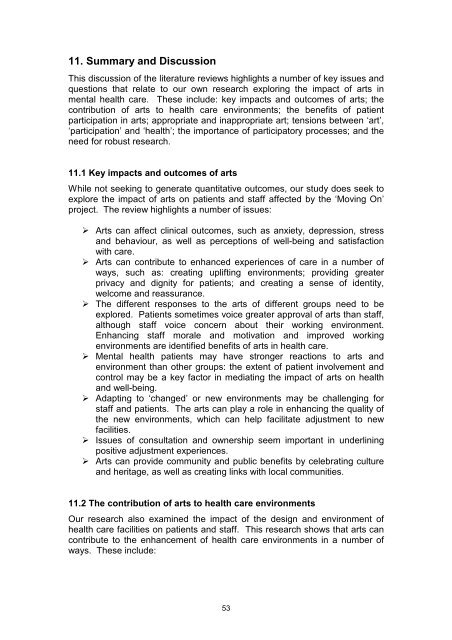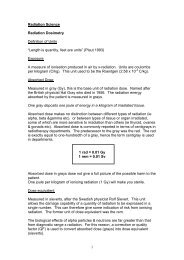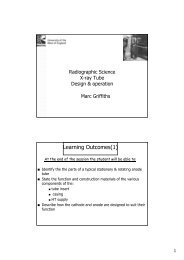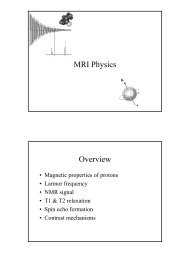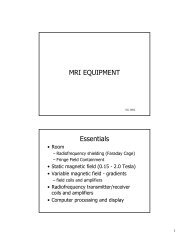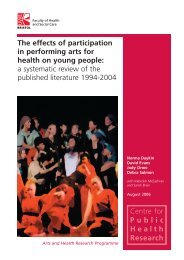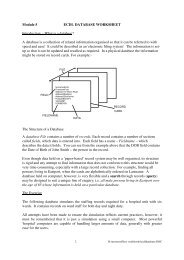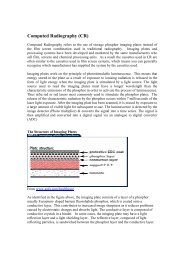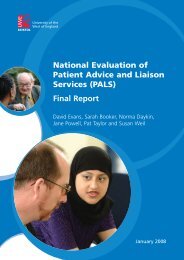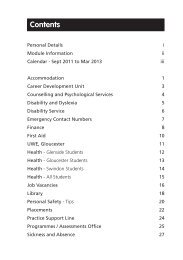Literature Review - HSC Home - University of the West of England
Literature Review - HSC Home - University of the West of England
Literature Review - HSC Home - University of the West of England
Create successful ePaper yourself
Turn your PDF publications into a flip-book with our unique Google optimized e-Paper software.
11. Summary and DiscussionThis discussion <strong>of</strong> <strong>the</strong> literature reviews highlights a number <strong>of</strong> key issues andquestions that relate to our own research exploring <strong>the</strong> impact <strong>of</strong> arts inmental health care. These include: key impacts and outcomes <strong>of</strong> arts; <strong>the</strong>contribution <strong>of</strong> arts to health care environments; <strong>the</strong> benefits <strong>of</strong> patientparticipation in arts; appropriate and inappropriate art; tensions between ‘art’,‘participation’ and ‘health’; <strong>the</strong> importance <strong>of</strong> participatory processes; and <strong>the</strong>need for robust research.11.1 Key impacts and outcomes <strong>of</strong> artsWhile not seeking to generate quantitative outcomes, our study does seek toexplore <strong>the</strong> impact <strong>of</strong> arts on patients and staff affected by <strong>the</strong> ‘Moving On’project. The review highlights a number <strong>of</strong> issues: Arts can affect clinical outcomes, such as anxiety, depression, stressand behaviour, as well as perceptions <strong>of</strong> well-being and satisfactionwith care. Arts can contribute to enhanced experiences <strong>of</strong> care in a number <strong>of</strong>ways, such as: creating uplifting environments; providing greaterprivacy and dignity for patients; and creating a sense <strong>of</strong> identity,welcome and reassurance. The different responses to <strong>the</strong> arts <strong>of</strong> different groups need to beexplored. Patients sometimes voice greater approval <strong>of</strong> arts than staff,although staff voice concern about <strong>the</strong>ir working environment.Enhancing staff morale and motivation and improved workingenvironments are identified benefits <strong>of</strong> arts in health care. Mental health patients may have stronger reactions to arts andenvironment than o<strong>the</strong>r groups: <strong>the</strong> extent <strong>of</strong> patient involvement andcontrol may be a key factor in mediating <strong>the</strong> impact <strong>of</strong> arts on healthand well-being. Adapting to ‘changed’ or new environments may be challenging forstaff and patients. The arts can play a role in enhancing <strong>the</strong> quality <strong>of</strong><strong>the</strong> new environments, which can help facilitate adjustment to newfacilities. Issues <strong>of</strong> consultation and ownership seem important in underliningpositive adjustment experiences. Arts can provide community and public benefits by celebrating cultureand heritage, as well as creating links with local communities.11.2 The contribution <strong>of</strong> arts to health care environmentsOur research also examined <strong>the</strong> impact <strong>of</strong> <strong>the</strong> design and environment <strong>of</strong>health care facilities on patients and staff. This research shows that arts cancontribute to <strong>the</strong> enhancement <strong>of</strong> health care environments in a number <strong>of</strong>ways. These include:53


